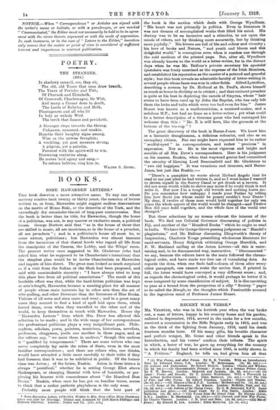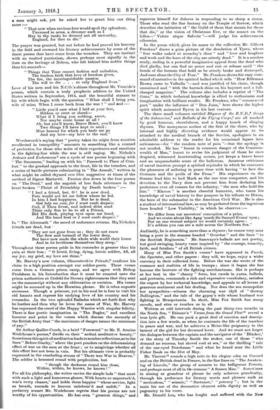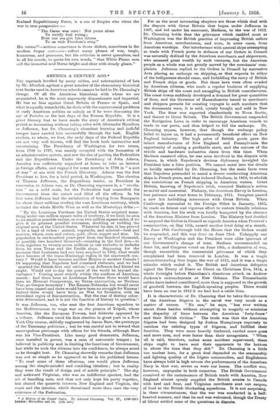RECENT WAR VERSE.* Mu. VERMEDE, who was in his fortieth
year when the war broke out, a man of letters, happy in his country home and his garden, enlisted in September, 1914, served in the ranks for a few months,. received a commission in the Rifle Brigade early in 1915, and was in the thick of the fighting from January, 1916, until his death fourteen months later. Of his many gifts, his lovable character and perfect temper, Mr. Geese and other friends speak in the Introduction, and his verses' confirm their tribute. The spirit in which, a hater of war, he gave up everything for the country in which his family had been settled since 1685, is nobly shown in " A Petition." England, he tells us, had given him all that
• (1) War Poems, and other Verses. By B. E. Vernedo. With an Introductory Note by Edmund Goma, C.B. London : W. Heinemann. [Ss. dd. net.1— (2) Anima's and Endurances. By Hobert Nichols. London : Chatto and Windus: [3a. ed. net.]—(3) Gloucestershire Friends : Poems fr...nt a German Prison Camp. By F. W. Harvey. London : Sidgwick and Jackson. 128. 6d. net.)--(4) On Leave: Poems and Sonnets. By E. Armin° Wodehouse. With a Foreword by Sir Arthur Quiller-Couch. London : Elkin Mathews, [Is. net.]—(5) The City of Fear, and other Poems. By Gilbert Fawkes. London : Ghetto and Windus. [Ss. 6d. net.)—(6) Rhymes of the A.N.D. London : Methuen and Co. [Is. 9d. net —(7) Songs of the Submarine. By Klaxon. London : McBride, Nast, and Co. [2s. ed. net.)—(8) Ballads of the Flying Corps. By G. It.. Samways, B.F.C. Same publishers and price.—(9) Small Craft. By C. Fox Smith. London : Eildrr Mathews. [2s. 6d. net.]—(10) Verses from the Grand Fleet. By Etienne (Lieut. MN.). London : MaedOnald. net.]----(11) Coronet, and other War Poems. By Charles Vincent. London : J. M. Dent and Sent. (4a. ed. net.1—(12) &and, Down By Donald H. Lea. London : Elkin Mathews. [2a. 6d. net.]
a man might ask, yet he asked her to grant him one thing more :- "That now when envious foes would spoil thy splendour, Unversed in arms, a dreamer such as I May in thy ranks be deemed not all unworthy, England, for thee to die."
The prayer was granted, but not before he had proved his bravery in the field and crowned his literary achievements by some of the finest poems that have come from the trenches. They are instinct with an exalted patriotism, shown perhaps most signally in the lines on the heritage of Nelson, who left behind him nobler things than his seacraft- " Things that Time cannot fashion and unfashion, The fearless faith that love of freedom gives, The fire, the inextinguishable passion The will to die . . . so only England lives."
Love of his men and his N.C.O.'s shines throughout Mr. Veniede's poems, which contain a truly prophetic address to the United States written in September, 1914, and the beautiful stanzas to his wife which begin with the question " What shall I bring you, wife of mine, When I come back from the war ? " and end :—
" Little you'd care what I laid at your feet,
Ribbon or crest or shawl—.
What if I bring you nothing, sweet, Nor maybe come home at all ? Ah, but you'll know, Brave Heart, you'll know Two things I'll have kept to send : Mine honour for which you bade me go And my love—my love to the end."
Wordsworth's saying that " poetry takes its origin from emotion recollected in tranquillity " amounts to something like a counsel of perfection for those who write of their experiences and emotions in the fighting-line while tho war is still raging. Mr. Nichols's Arclours and Endurances* are a cycle of war poems beginning with " The Summons," leading on with his " Farewell to Place of Com- fort " to the gradual approach to the front, life in the trenches, and a series of battle pictures culminating in " The Assault," written in what might be called rhymed veis Libre suggestive at times of the method of Signor Marinetti. Passion dies down in the four poems on " The Dead," and the anguish of loss finds utterance in the heart-broken " Plaint of Friendship by Death broken
" I had a friend, but, 0 ! ho is now dead.
Fate would not let me follow where ho led. In him I had happiness. But he is dead.
God help me now, for I must needs despair. God, if Thou livest, and indeed didat send Thine only Son to be to all a Friend, Bid His dark, pitying eyes upon me bend,
And His hand heal or I must needs despair."
In " The Aftermath " the mood of endurance returns. Mr. Nichols's friends are dead, but - " They are not gone from us ; they do not roam The flow and turmoil of the lower deep, But have now made the whole wide world their home And in its loveliness themselves they steep."
Throughout these poems pride in his comrades is greater than his pain at their loss : " 0 loved, living, dying, heroic soldier, All, all my joy, my grief, my love are thine."
Mr. Harvey's now volume, Gloucestershire Friends,* confirms his claim to a high position amongst our soldier-poets. These verses come from a German prison camp, and we agree with Bishop Frodsharn in his Introduction that it must be counted unto the prison authorities at Crefeld for literary righteousness that they sent on the manuscript without any obliteration or excision. His verses might be summed up in the Horatian phrase. He is rebus angustis animosus. Though a prisoner, yot in his soul he is free to visit his old haunts and express his undying love of his country and his comrades. In the two splendid Ballades which set forth first why he loathes and then why he loves the name of War, Mr. Harvey has expressed the creed of the Happy Warrior with singular felicity. There is fine poetic imagination in " The Bugler," and excellent humour and point in the verses which discuss the anomaly of the British Army that " the maximum of danger means the minimum of pay."
Sir Arthur Quiller-Couch, in a brief " Foreword " to Mr. E. Armin Wodehouse's poems,* dwells on their " ardent meditative beauty." Sometimes this spirit of meditation leads to sombre reflections,as in the lines " Before Ginchy," whore the poet ponders on the dehumanizing effect of war on the men at the front ; or to misgivings whether all this effort has not been in vain. But his ultimate view is probably expressed in the concluding stanza of "There was War in Heaven." The soldier is hemmed round with perplexities, but " though the darkness round him close, Within, within, he knows, he knows ! "
For all his philosophy, the writer envies the simple lads " that meet with such a light and humorous glance, With hearts so unperturb'd, war's every chance," and holds them happier " whose service, light as breath, ascends to heaven unlabour'd and unfelt." In a prefatory sonnet Mr. Wodehouse regrets that his poems are not worthy of his opportunities. He has seen " greatest things," and reproves himself for dulness in responding to so sharp a stress. Those who read the fine fantasy on the Temple of Sorrow, which describes the initiation of " the Guild of them that mourn for those that die," or the vision of Christmas Eve, or the sonnet on the fallen—" Valeta atque Salvete "—will judge his achievement otherwise.
In the poem which gives its name to the collection Mr. Gilbert Frankau5 draws a grim picture of the desolation of Ypres, whore " fear walks naked at noonday's clear " and " love and laughter and work and the hum of the city are utterly dead." It is a sombre study, ending in a powerful imaginative appeal from the dead who died gladly, but can find no peace and rest or release until " the bonds of the foeman that hold us be utterly broke and destroyed, And ours alone the City of Fear." Mr. Frankau shows his easy com- mand of narrative in the spirited ballad which tells " How Rifleman Brown came to Valhalla "—and was justified of his claim, though unmaimod and " with the barrack shine on his bayonet and a full- charged magazine." The volume also includes a reprint of " The Guns," in which technical knowledge is allied to enthusiasm and imagination.with brilliant results. Mr. Frankau, who " commenced poet " under the influence of " Don Juan," here shows the higher spirit which animated Byron in his last venture.
The three small volumes entitled Rhymes of the R.N.D.,* Songs of the Submarine; and Ballads of the Flying Corps,* are all marked by good humour, cheerfulness, and a happy knack of slinging rhymes. The anonymous author of the first of the three, who by internal and highly diverting evidence would appear to be attached to the medical branch of the Service, apologizes in an admirable address to the reader for his occasional lapses into seriousness—for " the random note of pain "—but the apology is not needed. He has " learnt in common danger of the Common- wealth of Man," learnt to revise his judgment of those he once despised, witnessed heartrending scenes, yet keeps a brave heart and an unquenchable sense of the ludicrous. Amateur criticisms of naval inaction prompt a spirited rejoinder in which he contrasts the pleasures of sailoring in peace time with having " to face the Germans and the perils of the Press." His experiences on tho Somme lead him to hail Muck as the one true conqueror, and his devotion to the Navy does not prevent him from declaring his preference over all comers for the infantry, " the men who hold the lino." " Klaxon " is another cheerful humorist, who turns his knowledge of naval history to fine purpose in his tribute to Dixon, the hero of the submarine in the American Civil War. He is also a student of international law, as may be gathered from the ingenious lines headed " Low Visibility," in which he observes :-
" We differ from our ancestors' conception of a prize, And we cruise about like Agag 'neath Sir Samuel Evans' eyes ; But on one eternal subject we would certainly agree : It's seldom you can see a mile across the Northern Sea."
And lastly, he is something more than a rhymer; he comes very near being a poet in the stanzas headed " Overdue " and the lines " to the Scottish Regiments." Mr. Samways's ballads are not poetry, but good swinging, hearty verse inspired by " the courage, tenacity, faith, and fatalism " of all British airmen.
Many of Miss Fox Smith's verses' have appeared in Punch, the Spectator, and other papers : they will, we hope, enjoy a wider
currency in their collected form. Before the war she wrote of the romance and realities of life in tramps ; since it began she has become the laureate of the fighting merchantman. She is perhaps at her best in the " chanty " form, but excels in yarns, ballads, and portraits, commands a rich and expressive vocabulary, satisfies the expert by her technical knowledge, and appeals to all lovers of generous sentiment and fair dealing. Nor does the sea monopolize her sympathies—witness the charming war idyll of " drowsy Bullington," and the tale of the gypsy's wife whose husband was fighting in Mesopotamia. In short, Miss Fox Smith has many moods, and stirs or touches us in all.
Written at odd intervals during the past thirty-two months in the North Sea, " Etienne's " Verses from the Grand Fleet" reveal a
true lyric gift. He can pack a great deal of emotion and descrip- tion into a few words, as when he contrasts the life of the trawlers in peace and war, and he achieves a Heine-like poignancy in the lament of the girl for her drowned lover. And we must not forget the dialogue between the captain and the navigator of the ' Blucher,' or the story of Timothy Smith the stoker, one of those " who demand no reasons, but shovel coal at sea," or the thrilling " tale of the one-eyed Dutchman " and what he heard near the Little Fisher Bank on tho 31st of May.
Mr. Vincent n sounds a high note in his elegiac odes on Coronel and on the British dead in France, in the fine lines on " The Awaken- ing of Lincoln," the group of sonnets to the belligerent Powers, and perhaps most of all in t?ii stanzas " A Sussex Man." Sometimes in aiming at grandeur of phrase he only achieves grandiosity, through his preference for literary words and phrases such as " meticulous," " seismic," " fluctuant," " potency " ; but in the main his use of the decorative element adds dignity as well as pageantry to his verse.
Mr. Donald Lea, who has fought and suffered with the New
Zealand Expeditionary Force, is a son of Empire who views the war in true perspective :- " The Cause was ours ! Not yours alone To rectify foul wrong; i Ever our sea-girt Isles intone To us wide Freedom's song."
His versesu—written sometimes in Scots dialect, sometimes in the modern lingua castrensis—reflect many phases of war, tragic, humorous, and gruesome, but his criticism is never querulous, and in all his moods, to quote his own words, " that White Flame men call the immortal soul Burns bright and clear with steady gleam."




































 Previous page
Previous page